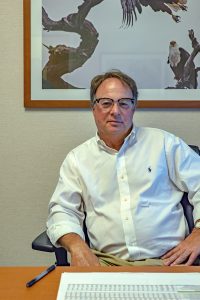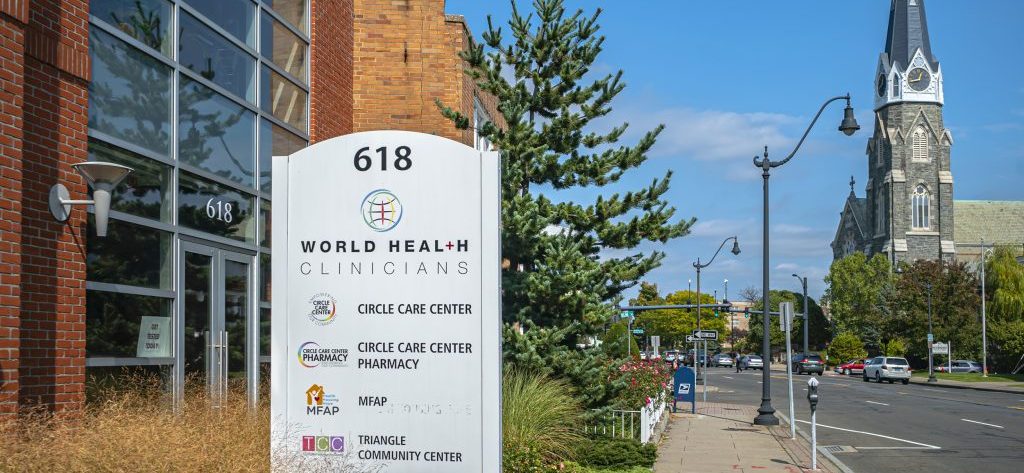Norwalk-based health center provides
quality care for all
By Cara Rosner / Photography By Daniel Eugene
Alot can change in seven years.
When Circle Care Center opened in Norwalk in 2012, remembers CEO Mark Hammond, “it was formed basically as a men’s center to treat HIV.” As such, it gained a reputation as a welcoming atmosphere staffed with knowledgeable medical experts for members of the LGBTQ community, particularly gay men.
These days, the AIDS epidemic is waning in Connecticut. According to the Connecticut Department of Public Health, the number of new HIV infection cases dropped from 812 in 2002 to 281 in 2017, the most recent year for which data is available. That’s a great thing, but the trend means Circle Care Center has needed to shift its focus to stay relevant.
“Over the years, it has morphed because [the disease] has morphed, and the treatment of the disease has morphed,” Hammond says of the center. “We have very few new HIV-positive cases; we have a couple a year, which is great.”
Adds Medical Director Dr. David Rubin, “The AIDS epidemic in Connecticut is sort of folding down, so we’re not really seeing many new patients [for that].”
Against that backdrop, the center’s concentration now is largely on HIV prevention, particularly with the advent of TRUVADA for PrEP. The prescription medication can help reduce the risk of getting HIV through sex when taken daily and used with safer sex practices, according to its manufacturer Gilead. PrEP stands for pre-exposure prophylaxis.

“I have more people on TRUVADA for PrEP than I do under treatment for HIV, and that’s the goal,” says Dr. Rubin. While “gay men are the easiest people to give it to, because the risk is the most obvious,” he adds, many within the LGBTQ community can benefit from it.
The AIDS epidemic in the United States will end “soon,” says Dr. Rubin, but it’s unclear exactly how quickly that will happen. In the meantime, TRUVADA for PrEP – the only medication of its kind, for now – is a powerful tool.
Another change? Staff are increasingly treating transgender patients.
“We have many, many transgender patients, whereas five or six years ago we did not,” Hammond says of the medical center as well as counseling services. “A very large portion of our population is transgender.”
Overall, the center has more than 1,000 active case files. Its staff is comprised of Dr. Rubin and a family nurse practitioner, both of whom specialize in HIV and related illness treatment; one registered nurse; two medical assistants; a licensed clinical social worker; and two office staff, according to Hammond.
The center continues to play an important role in the LGBTQ community but also treats a growing number of non-LGBTQ patients.
“We treat everybody,” Hammond says, noting the facility is a primary care center by license, but specializes in sexually transmitted diseases and sexual health.
Whether they’re LGBTQ or not, patients are drawn to the center’s high-quality and personalized care, says Dr. Rubin.
“We’re a very welcoming, patient-focused practice. Our priority and our mission is patient-focused care,” he says. “When a patient walks through our door, it doesn’t matter to me or my colleagues who that patient is. It doesn’t matter who they are, we’re going to take care of them.”
Many patients first come to the center for sexually transmitted disease testing and end up liking the staff and atmosphere so much they opt to receive their primary care there, he says.
“We try to spend as much time as possible interviewing the patient and getting to know their needs,” says Hammond.
In some cases, LGBTQ patients had primary physicians elsewhere whom they liked – until the topic of their sexuality came up, says Dr. Rubin. Some patients may feel uncomfortable, self-conscious, or judged at other practices.
“When they come here, they see the level of medical care is very high and, at the same time, they can discuss their sexuality and their needs,” he adds. “The word gets around that we’re that kind of center, and it’s attracting patients.”
Demographically speaking, Circle Care Center’s patient roster runs the gamut. The facility treats people from teenagers to the elderly.
“My oldest patient is 94,” says Dr. Rubin. That patient, he adds, was dishonorably discharged from the military following World War II because he was gay and later received a presidential apology from Barack Obama’s presidential administration.
Providing care at the center is more than merely a job for Dr. Rubin; it’s a calling. He is an HIV specialist who has focused his career on the disease. Prior to coming to Circle Care Center, he administered an AIDS center in New York City for 27 years. He also specializes in treating Hepatitis C.
“My interest and passion is HIV, and working with patients to get them the latest and best treatments,” he says. “It’s becoming less complicated and it’s becoming something that doesn’t require as much time as it used to.”
The center houses a specialty pharmacy, staffed by two pharmacists and two pharmacy technicians. Any profits made by the pharmacy are reinvested into the community, says Hammond – another attribute which makes the center’s model unique.
Among those community investments, Circle Care Center in 2014 began funding the Moore Place Housing Program at Mid-Fairfield AIDS Project. Since then, the center has granted more than $500,000 to support the project.
In addition, since Circle Care Center’s inception in 2012, it has granted more than $1 million to Triangle Community Center (TCC) to expand TCC’s programming and services. In 2015, Circle Care Center granted TCC funding to launch its case management and social service navigation program for LGBTQ individuals.
“We put a lot back into the community,” says Hammond. “That’s where we really stand out.”
It’s a model Hammond hopes to extend, with preliminary plans in the works to grow Circle Care Center’s footprint beyond Connecticut.
“We are looking to expand the model to other regions,” he says. “There is a need. And if we can fill that need, not only in Fairfield County, it makes sense to expand the model and give back to those communities.”








More Stories
A Leader in Care for LGBTQ+ Communities: Meet Kenneth Abriola, MD
Transforming Sexuality: Handling Sexual Changes for Trans Folks
MHC’s “Let’s Face It” Program Expands Mental Health Awareness